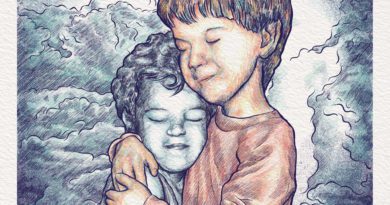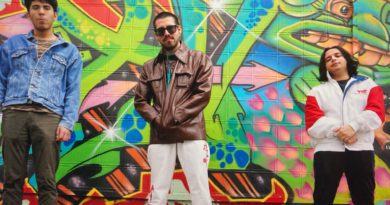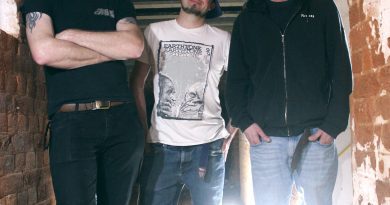Ondt Blod – Natur (2018)
 I will admit that when I received a copy of Ondt Blod‘s latest album to review, I was excited. Not only was the band Norwegian, meaning there would be a tinge of Scandinavian rock in their music; but, the album comes with a strong political message. It’s true that the album is sung entirely in Norwegian and even my knowledge of Afrikaans can’t help here, but it presented a challenge. As it turns out, this was a challenge I was very happy to undertake.
I will admit that when I received a copy of Ondt Blod‘s latest album to review, I was excited. Not only was the band Norwegian, meaning there would be a tinge of Scandinavian rock in their music; but, the album comes with a strong political message. It’s true that the album is sung entirely in Norwegian and even my knowledge of Afrikaans can’t help here, but it presented a challenge. As it turns out, this was a challenge I was very happy to undertake.
Warning: As a review of a politically-charged album looking at the discrimination of the Sami people, some wording may be construed as offensive. Please note that my intention is not to offend, but only to share my opinion of Ondt Blod’s album.
The album begins with ‘Natur’ and acts as a type of Sami call to arms. Musically, this track is an exceptional blend of styles ranging from hardcore metal with heavy riffs to a more melodic chorus where you could sing along if you really wanted to. The movement between metal and melody was instigated by a joik in the first ten seconds performed by Ella Marie Hætta Isaksen of ISAK, and I found this introduction particularly insightful. The joik is an authentic Sami music style that is, according to Wikipedia, sung slowly and deep in acapella with an emotional content of anger or sorrow. So, it only makes sense that this indigenous form of music culture would be the beginning of the album.
While the Norwegian Sami people, known by the English as Laplanders, have been recognised as indigenous people entitled to the protection of their culture and way of life, there is an underlying sense of bigotry. They may be able to preserve and develop the Sami lifestyle, but it is also put on parade whenever Norwegian culture is being displayed as a tourist attraction. Think reindeer herding or traditional clothing on postcards. The lyrics of ‘Natur’ – yes, I have the English translation – are representative of a new Sami generation tired of dealing with discrimination and desperate to be taken seriously instead of constantly pushed to the side until it pleases the high lords.
The next track, ‘Andre Liv’, is completely unlike ‘Natur’ boasting a more Canadian punk rock design and reminding me of Billy Talent. Upon doing some research, I discovered that this song revolves around a situation where one of Aslak’s friends was raped and how violence was the vengeful reaction. As a woman, I cannot imagine anything more devastating than being raped; however, the song takes a curve when it shows that while violence can be a natural reaction the more effective reaction is to be supportive of the person. My favourite line is, “living well is the best revenge”.
The simplest way to define ‘Start Han Opp’ and ‘Unge Kniva’ is using the final lyric from ‘Unge Kinva’ – “young and hungry until the day I die”. Imposing songs indicating an ominous presence from this new Sami generation from the four states. They are prepared to stand up for their beliefs, do not fear the challenges they may face, and with the heavy guitar riffs, they are sure to make an impression.
One of the most enjoyable aspects of ‘Med Ulver’, I find, is the constant changes in tempo. A hard and heavy speed guitar-filled verse followed by a more pop-rock focused chorus. Moreover, approximately two minutes into the track there is a further reduction in tempo. After a classic rock-esque guitar solo, we see a much slower tempo with a strong focus on the bass and more exposed representation of Aslak’s singing voice. Could this expression be symbolic of the Sami’s examination of their situation and holding on for a new tomorrow?
Expectations, regrets and desires – all people have these. Even if you are strong-willed enough to not hold any expectations, the chances are likely that you will have desires and certain regrets in life. This is what Når Sirenan Sakte Dør is all about. Set to a punk rock beat, the song discusses the young person’s longing for what could have been while regretting all the choices they have made to that point. It is a removal of responsibility, a fall from obligation and a celebration of friends who are able to support you when you land on the ground.
‘Store Ord (Røyk Og Speil)’ and ‘Giftige Tunga’ are songs about friendships that have gone awry. Aslak pointed out to TeamRock.com that ‘Store Ord (Røyk Og Speil)’ is a song about his leaving home, and how distance and time can result in friendships fading. It looks at the relationship, what it meant to the friends and how people feel after time has passed from the perspective of the person who remained behind. A punk rock tune that is highly relatable for most people in today’s society where travelling is a common occurrence.
‘Giftige Tunga’ has a more metal feel but also approaches the demise of a friendship. Unlike ‘Store Ord (Røyk Og Speil)’, it does not look at time and distance as causes of relationship disintegration but rather more narcissistic concepts like jealousy and self-promotion. A seemingly crass song telling how people will take your arm if you give them a finger, the song is insightful living in a “dog-eat-dog” world. I found both of these tracks enjoyable and understandable, although I did need the lyric translation sheet.
‘Storma’ is probably my favourite track on Natur for the simple reason that it has a saxophone undertone. A punk jazz style dominates ‘Storma’ melding the melody using a high-speed saxophone in the background, as performed by Lauritz Lyster Skeidsvoll. The track is bittersweet telling us about a failing relationship where hearts are torn apart, where painful dreams are not being forgotten, and while he has spent his life running would they be willing to try again?
The final track, ‘Giron’, clocks in at just over five minutes and is the longest track on the album. I found this closer particularly fascinating because it seems to tie in with the opening ‘Natur’ regarding style causing a “loop” of sorts. Sami-pop singer Ella Marie Hætta Isaksen makes a reappearance and performs a joik duet with Aslak in this track accompanied by the traditional Sami hand drum. The duet begins about two minutes in and peters out one and a half minutes later making way for heavy guitar riffs.
‘Giron’ does not focus on relationships or friendships, well not in a blatant sense; this track deals with the issue of Sami male suicide. The suicide rates of Sami males in all four states are significantly greater than that of the general population. Unfortunately, Nordic states do not allow registration of ethnic citizens making it impossible to obtain recent statistics on the suicide rates; however, Sami Councils have acknowledged the growing trends of suicide among Sami males. Plans have been put into effect to help deal with the prevention of suicide among Sami males, looking at mental health and other causes. This song looks at the situation and points out the fear of death.
Christian Slater once said, in his role as JD in Heathers, that everyone’s life has static and what I love about Natur is that it proves this point. Each of these tracks examines a separate factor of the Sami male’s life ranging from their desire to overcome the high lords, to being torn from old friends to fearing mental health and suicidal thoughts. While I had the English translation of the lyrics, I must admit that the most powerful part of the album was the joik. I think that Ondt Blod showed me that you do not need to understand words to understand an album, meaning does not require recognition. This is an album I will be downloading and I will be putting on repeat.
Natur was released on March 9th and can be purchased via Ondt Blod’s official website.
Images courtesy of Terje Arntsen and Prescription PR.
![]()


